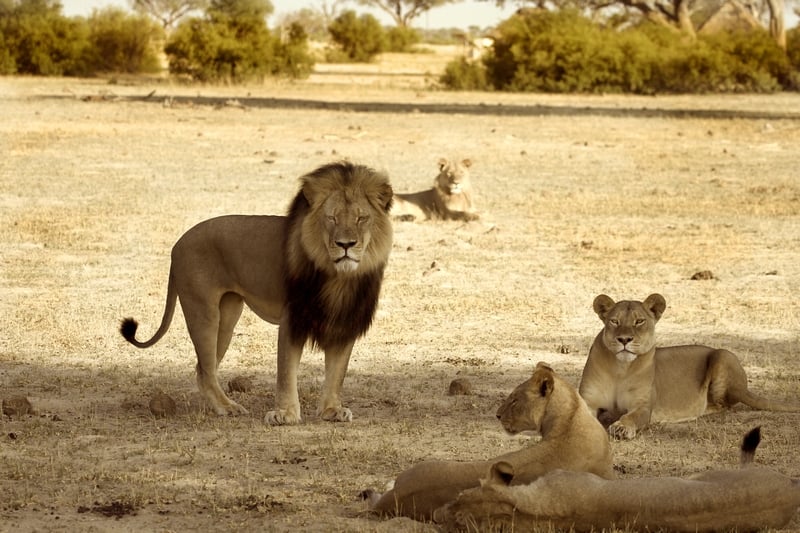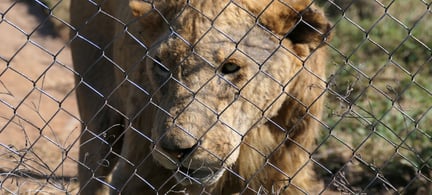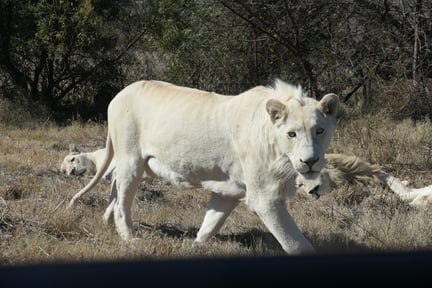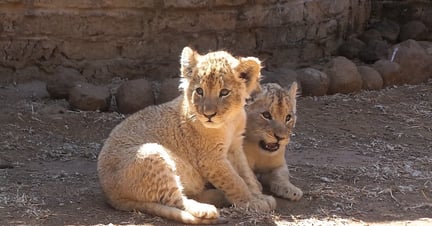
Learn about Cecil the Lion and the devastating impact of trophy hunting on wildlife conservation.
Cecil the Lion and the American Dentist
On July 1, 2015, an American dentist paid US$50,000 to kill Cecil the lion.
Shot with a crossbow, 13-year-old Cecil was left wounded and in pain, before finally being killed many hours later. The world understandably reacted with outrage, with global news coverage and a social media storm showing just how strongly people felt about his death.
At the time of the shooting, our CEO Steve McIvor said:
The cruelty behind this act is disturbing – not only was Cecil shot with a bow and arrow, he was then found alive hours later and shot by a gun. The rearing and killing of lions in the name of ‘entertainment’ must end. Animals belong in the wild and should not prop up this sordid industry.
The impact of Trophy Hunting on Lion Populations
Every wild animal contributes to the interactions and dynamics of the population and ecosystem they live in. That is especially true of lion prides.
The true cost of trophy hunting a lion:
- Trophy hunting disrupts the social bonds important for a pride - removing one member causes stress
- When a dominant male is killed, the pride becomes vulnerable to attacks from other males looking to take over
- Hunting may increase the killing of cubs within prides, that could be the offspring of the deceased dominant male
- When females are targeted, if they have young, they are likely to fall victim to starvation or be killed by predators
Cecil brought many tourists to Zimbabwe’s famous Hwange National Park and was being studied by researchers at Oxford University at the time of his shooting. But trophy hunting has an impact that reaches far beyond the individual animal that is killed. Cecil jointly led two prides containing numerous lionesses and cubs, all of whom would have been affected by his death.
Tackling trophy hunting remains a priority
While the story of Cecil is heart-breaking, it isn’t an isolated incident. Two years later, Cecil’s son Xanda, a six-year-old lion with several young cubs, was shot dead by a trophy hunter, outside the same national park where his father died.
According to a Humane Society International study (2021) the most common captive-source species exported from South Africa was the African lion, comprising 58% of the total number of captive-source trophies exported. A total of 3,924 captive-source African lion trophies, or 785 per year on average, were exported during 2014-18
Where does Africa’s trophy hunting money go?
It is clear trophy hunting is still a lucrative global business hiding behind a smokescreen of benefitting local economies and communities. In South Africa for example, profits from the trade represent less than 2% of the country’s economy, despite some 21 million hectares of land currently being utilised for trophy hunting.
The majority of any economic profits made from the animal’s death do not make it back to the actual communities who live alongside the wildlife, land used for hunting generates much smaller profits than land used for agriculture or livestock breeding.
Hunting Lions is not ethical or sustainable
Trophy hunting is not an acceptable approach to sustainable development and conservation.
Investment should be made in other non-lethal economic alternatives including wildlife friendly tourism. Because the life of a wild animal is worth so much more than the trophy it is too often reduced to.
Trophy hunting treats wild animals as resources to be exploited for commercial gain, rather than respecting them as the sentient beings they are. It is outdated and inhumane. Lions are not trophies; they are not medicine; they are not entertainers.
They are wild animals with the right to a wild life.
Related content
Putting a stop to cruelty
World Animal Protection report shines a light on illegal lion farms in South Africa despite government announcement to phase captive lion breeding out.
Protecting South African Lions
Blog
South Africa’s government outlined mandatory exit options for the captive lion industry, discover the crucial steps needed to protect South African lions.
Discover the dark side of cruel lion tourism
Blog
Trends to walk with lions and to pet lion cubs causes a lifetime of suffering. Tourists are inadvertently helping to fund their ongoing torture.


